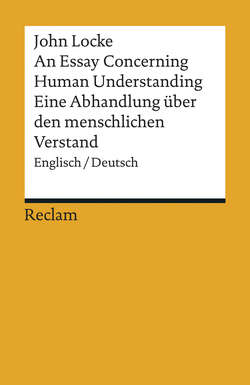Читать книгу An Essay Concerning Human Understanding / Ein Versuch über den menschlichen Verstand. Auswahlausgabe - John Locke - Страница 32
На сайте Литреса книга снята с продажи.
[274]CHAPTER XXII
ОглавлениеOf Mixed Modes
§ 1. […] the Complex Ideas, we mark by the names Obligation, Drunkenness, a Lye, etc. which consisting of several Combinations of simple Ideas of different kinds, I have called Mixed Modes, to distinguish them from the more simple Modes, which consist only of simple Ideas of the same kind. These mixed Modes being also such Combinations of simple Ideas, as are not looked upon to be characteristical Marks of any real Beings that have a steady existence, but scattered and independent Ideas, put together by the Mind, are thereby distinguished from the complex Ideas of Substances.
§ 2. […] The Mind […] being once furnished with simple Ideas, it can put them together in several Compositions, and so make variety of complex Ideas, without examining whether they exist so together in Nature. And hence, I think, it is, that these Ideas are called Notions: as if they had their Original, and constant Existence, more in the Thoughts of Men, than in the reality of things; and to form such Ideas, it sufficed, that the Mind put the parts of them together, and that they were consistent in the Understanding, without considering whether they had any real Being: though I do not deny, but several of them might be taken from Observation, […]. For the Man who first framed the Idea of Hypocrisy, might have either taken it at first from the observation of one, who made shew of good Qualities which he had not; or else have framed that Idea in his Mind, without having any such pattern to fashion it by. […]
[276]§ 3. […] an usual way of getting these complex Ideas, is by the explication of those terms that stand for them. For consisting of a company of simple Ideas combined, they may by words, standing for those simple Ideas, be represented to the Mind of one who understands those words, though that complex Combination of simple Ideas were never offered to his Mind by the real existence of things. Thus a Man may come to have the Idea of Sacrilege, or Murther, by enumerating to him the simple Ideas which these words stand for, without ever seeing either of them committed.
§ 4. Every mixed Mode consisting of many distinct simple Ideas, it seems reasonable to enquire, whence it has its Unity; and how such a precise multitude comes to make but one Idea, since that Combination does not always exist together in Nature. To which I answer it is plain, it has its Unity from an Act of the Mind combining those several simple Ideas together, and considering them as one complex one, consisting of those parts; and the mark of this Union, or that which is looked on generally to compleat it, is one name given to that Combination. […] Thus, though the killing of an old Man be as fit in Nature to be united into one complex Idea, as the killing a Man’s Father; yet, there being no name standing precisely for the one, as there is the name of Parricide to mark the other, it is not taken for a particular complex Idea, nor a distinct Species of Actions, from that of killing a young Man, or any other Man.
[278]§ 5. If we should enquire a little farther, to see what it is, that occasions Men to make several Combinations of simple Ideas into distinct, and, as it were, settled Modes, and neglect others […], we shall find the reason of it to be the end of Language; which being to mark, or communicate Men’s Thoughts to one another, with all the dispatch that may be, they usually make such Collections of Ideas into complex Modes, and affix names to them, as they have frequent use of in their way of Living and Conversation, […].
§ 6. This shews us how it comes to pass that there are in every Language many particular words, which cannot be rendred by any one single word of another. For the several Fashions, Customs, and Manners of one Nation, making several Combinations of Ideas familiar and necessary in one, which another people have had never any occasion to make, or, perhaps, so much as take notice of […].
§ 7. Hence also we may see the Reason, Why Languages constantly change, take up new, and lay by old terms. Because change of Customs and Opinions bringing with it new Combinations of Ideas, which it is necessary frequently to think on, and talk about, new names, to avoid long descriptions, are annexed to them; and so they become new Species of complex Modes. […]
[…]
§ 9. There are therefore three ways whereby we get these complex Ideas of mixed Modes. 1. By Experience and Observation of things themselves. Thus by seeing two Men wrestle, or fence, we get the Idea of wrestling or fencing. 2. By Invention, [280]or voluntary putting together of several simple Ideas in our own Minds: So he that first invented Printing, or Etching, had an Idea of it in his Mind, before it ever existed. 3. Which is the most usual way, by explaining the names of actions we never saw, or Notions we cannot see; and by enumerating, and thereby, as it were, setting before our Imaginations all those Ideas which go to the making them up, and are the constituent parts of them. […]
§ 10. It is worth our observing which of all our simple Ideas have been most modified, and had most mixed Modes made out of them, with names given to them: And those have been these three; Thinking, and Motion, (which are the two Ideas which comprehend in them all Action,) and Power, from whence these Actions are conceived to flow. […]
[…]
